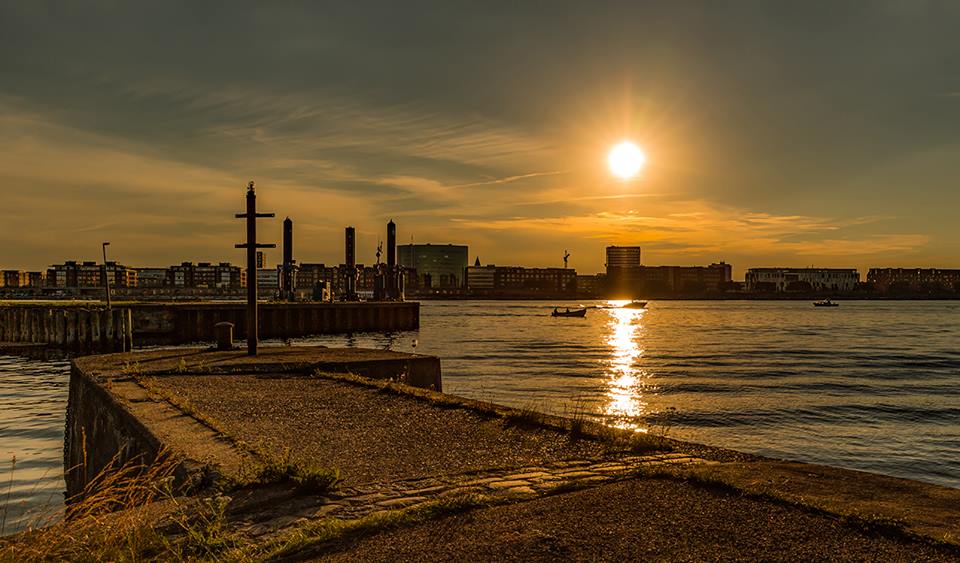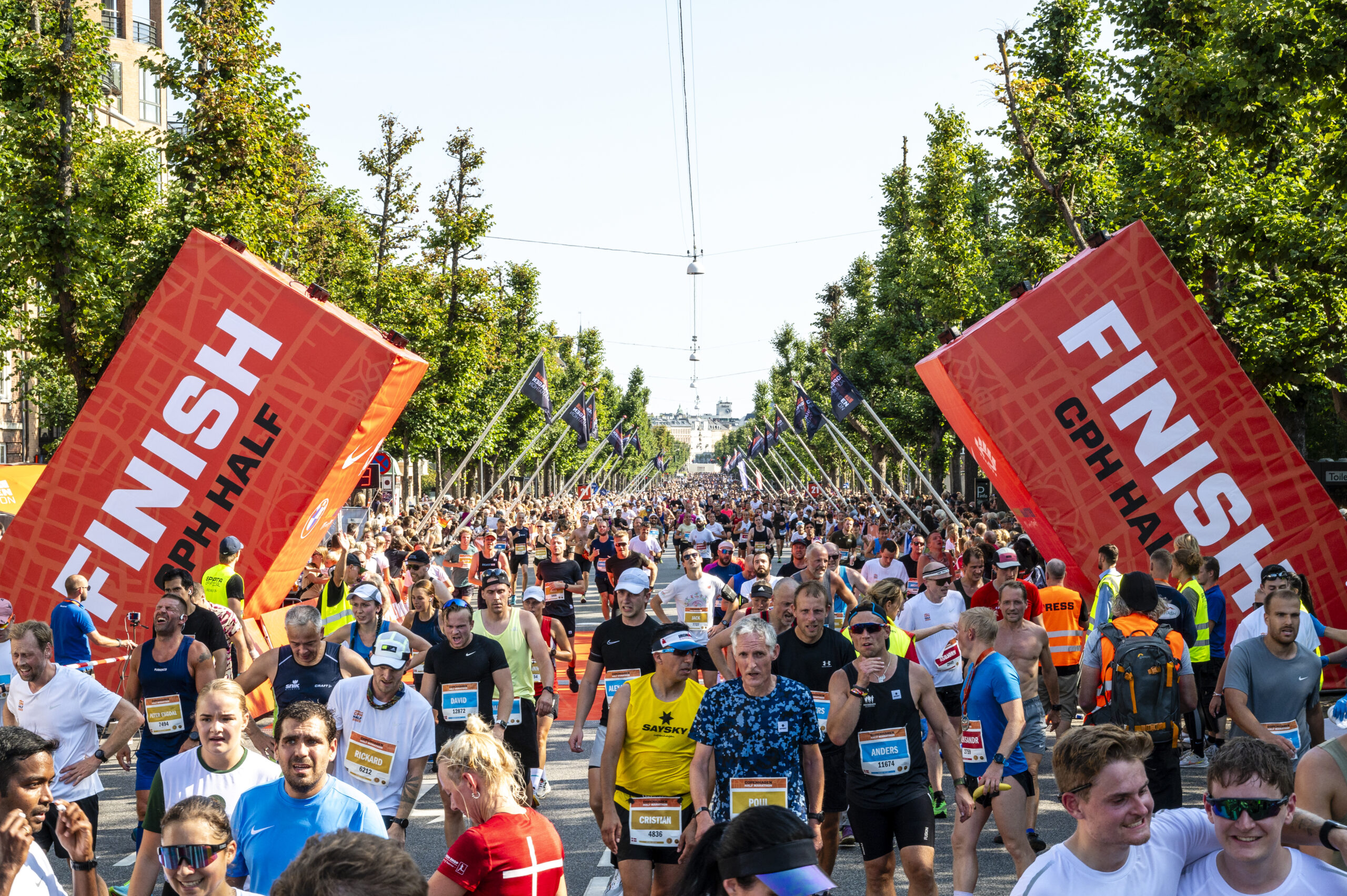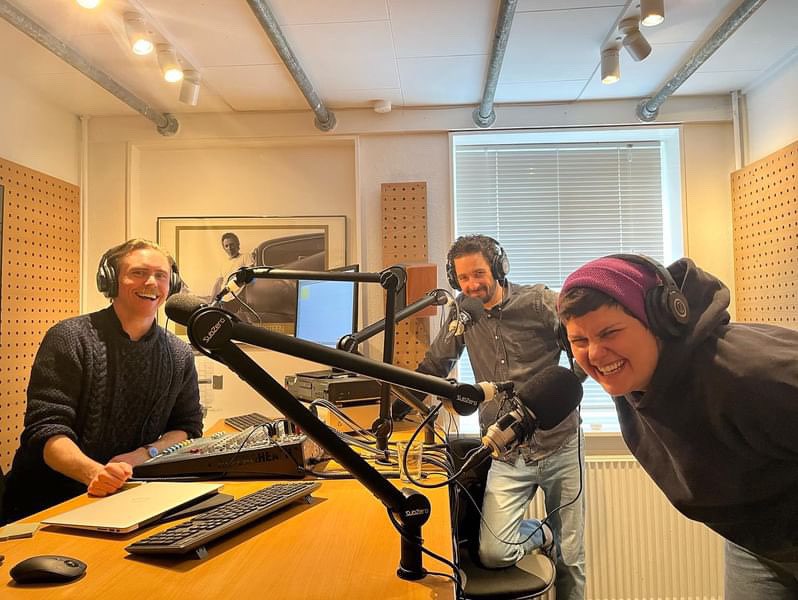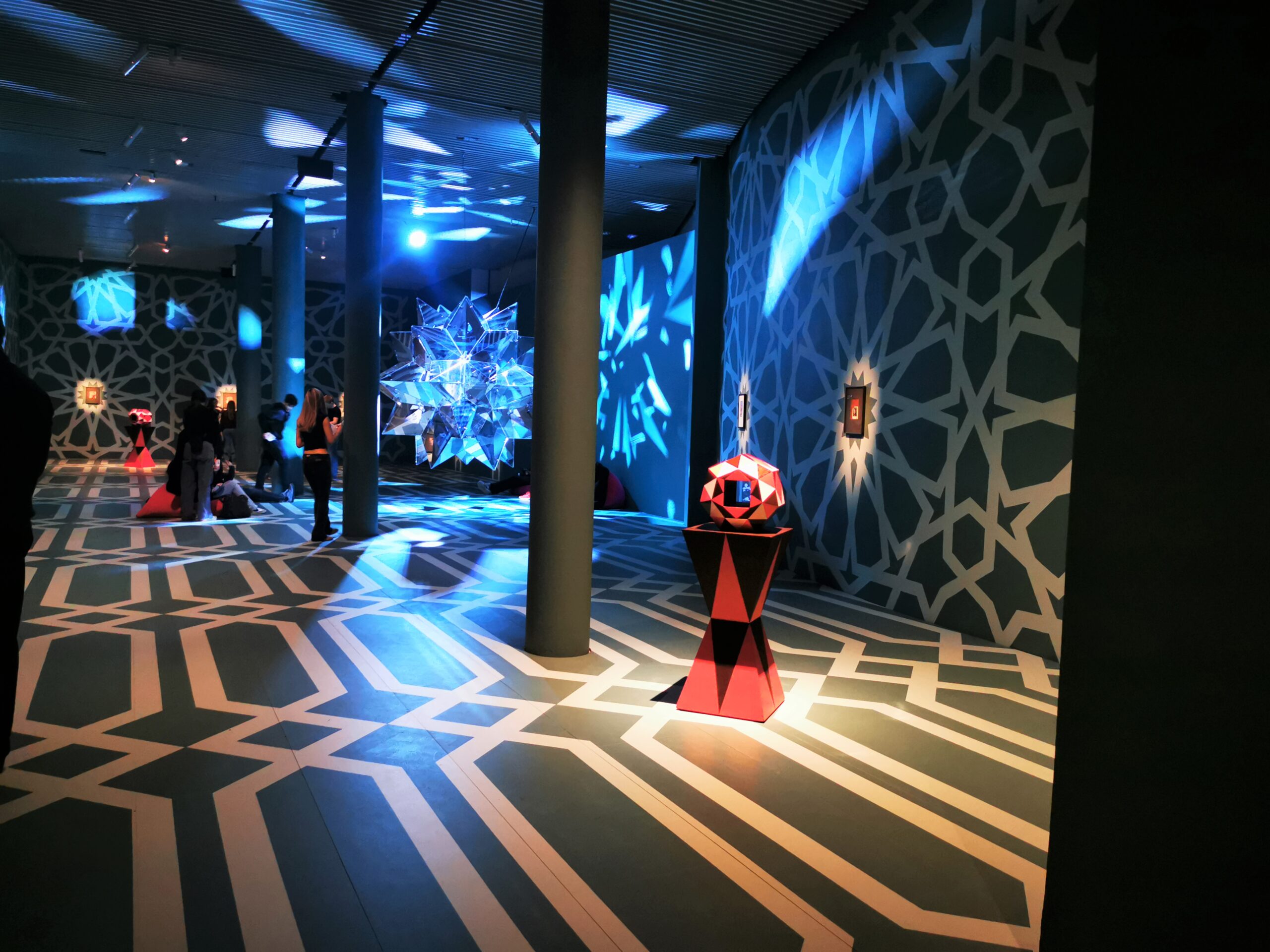The first thing that strikes you walking towards Teaterøen (Theatre Island) is how high the vaulted sky is and how spacious the surrounding area is. It makes you raise your head and breathe more deeply.
It recalls the Danish idiom ’højt til loftet’ (high ceiling). Danes like to say this when they want to suggest an environment where imagination, inspiration and off-the-wall ideas can flourish untrammelled by rules or convention.
And it’s remarkable to think all of this is located just a short journey from central Copenhagen on the island of Refshaleøen, the city’s former shipyards, which is quickly transforming into the Danish capital’s biggest hub for culture, street food, startups and extreme sports.
Theatre Island is perfectly placed to capitalise on the first full of year of business at Reffen, the new home of street food following the 2017 closure of Papirøen, with hundreds of thousands expected to visit the area this year.
Not only is that good news for theatre in general, as more members of the public will learn to associate the area with the genre, but it is also good news for the English-language scene, as Theatre Island has a strong international focus.
Bilingual profile
Theatre Island may officially be a platform for theatre groups, but looks and feels more like an artistic collective – a vibrant, collaborative and constantly shifting community for Danish and international actors and artists.
The agenda advocates pushing boundaries and defying traditional expectations in an attempt to put Copenhagen on the map internationally as a place where theatrical possibilities are being rejuvenated and redefined.
The place already has a bilingual profile (Danish and English), and according to its founders, Peter Kirk and Tilde Knudsen, the intention is to appeal to both Danes and foreigners.
Some plays are therefore available in both languages – and some plays will be taken on the road so theatre-lovers far from these shores can experience what Theatre Island is all about.
In strong demand
“We call Teaterøen an ‘open platform’ for performing arts – open in the sense of being curious about and open to new formats, audiences and concepts,” explained Kirk and Knudsen.
“We are experiencing a great need for foreign language theatre, and we are slowly building this up – both for tourists and expats. And we have also discovered a growing need for foreign artists to have a platform, and it makes sense for us to open up for being ‘international in a local way’.”
Among the pair’s plans are expanding their annual Asteroid international theatre festival (very probably from 2020), running a bilingual theatre festival for young audiences in September, and presenting one-off English versions of all their Danish-language plays – on what will be billed as “all-English days”.
Additionally, they view Theatre Island as a “port” to welcome performing artists and theatre groups from all over the world – for short or long visits, guest plays, residencies, summercamps, workshops and collaborations with Danish artists.
Kirk and Knudsen have mostly self-funded the island – a location they first started using as a rehearsal space 13 years ago, which they officially opened for business as Teaterøen in 2013.
A cavernous complex
Within the walls of the three-building complex is a complete theatrical landscape. This means Teaterøen can offer the groups who use its various rooms the complete journey: from early-stage development to experimentation to rehearsals to a performance in a 150-seater auditorium.
The site includes lofts, groves, uncategorisable nooks and crannies, halls, barracks, a shipyard annex, a military battery and a demagnetisation facility (all now decommssioned, of course).
Outside the grounds are pretty huge, and as well as the three main buildings, there are two smaller buildings, outdoor saunas and caravans.
Saviours of the stage
Teaterøen is a godsend for theatre groups like Leftfield Theatre, as finding a suitable venue can often be a problem.
Leftfield is staging its next play – Truth by Falsehood, which starts on April 23 (details on pages 5 and 21) – in Teaterøen’s 150-seat auditorium, and its artistic director Lee Elms could not be happier.
“Finding good venues in Copenhagen is difficult and expensive and the ones that are affordable are usually rundown and managed in a slipshod way,” he told CPH POST.
“Take Huset KBH, for example, where live music can drown out performances, equipment gets stolen and the committee are discriminatory about who they let perform there. Everyone’s feeling sorry for poor old House of International Theatre (HIT).”
Elms is confident Kirk and Knudsen have a hit on their hands at a location that will quickly become “the hippest part of town”.
“Like many of us, Peter and Tilde are theatre nuts, and they and their staff are so supportive, making it possible for smaller theatre groups and individuals with limited resources to put on shows,” he continued.
“If Denmark is ever to become a major player in performing arts, or the scene is saved from itself, it’s creative meccas like Teaterøen who’ll be providing the new roadmap because they’ve broken down the gates, opened up the sky to all of the possibilities and, ahem, like Leftfield, they’re redefining the theatrical landscape.”
A hive of activity
In addition to theatre, Kirk and Knudsen are keen to get the maximum usage out of their site, and they welcome all manner of events, from concerts and exhibition, to symposiums, conferences and festivals.
Weddings and one-off event bookings are welcome as well, and among its current regular events is Teater Tapas, a monthly gathering of theatre-lovers who watch each other perform short pieces and enjoy tapas together.
Kirk and Knudsen not only run the island, but also produce a lot of theatre themselves. Since 2003, their group, Asterions Hus, has earned a strong reputation for experimental and physically-charged performances.
To redefine the theatrical landscape of Copenhagen, Teaterøen will need the support of like-minded groups like Leftfield, which since its foundation in 2017 has sought to push the boundaries of the artform.
Lee Elms, its artistic director, took some time out ahead of Leftfield’s next production ‘Truth by Falsehood’, to talk to CPH POST about his ambitious staging and future plans in an environment that he believes is badly in need of a shake-up.
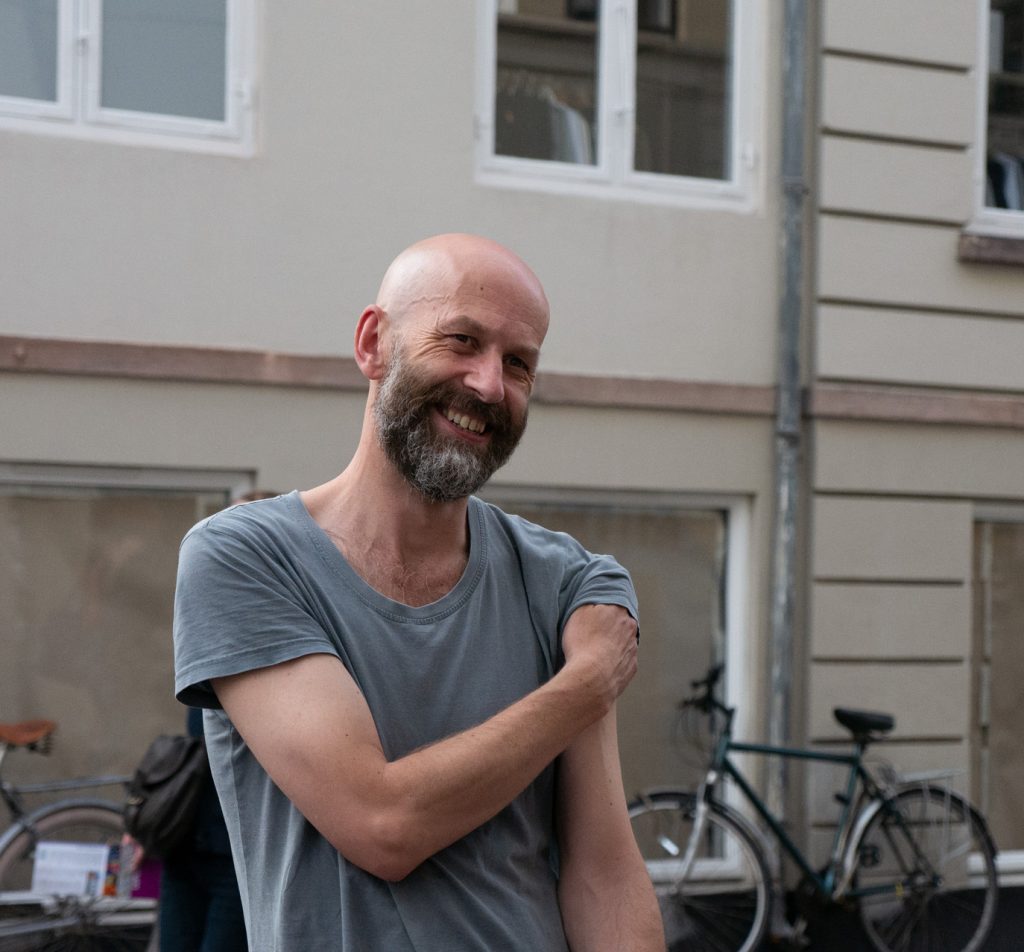
The title ‘Truth by Falsehood’ suggests you’ll be tackling some huge themes with which our culture seems to be wrestling at the moment?
I could wax indignant about fake news and liars in power and Twitter lynchings and how widespread social and mainstream media is triumphing and flattening all communication into a single, homogenous surface, but the truth is that ‘Truth by Falsehood’ has nothing to do with any of that.
I’ve got to keep my cards close to my chest because there’s some huge twists in this production, but with this title we’re acknowledging that most theatre audiences willingly suspend disbelief and overlook the fact they’re watching a staged performance and accept it as reality in order to be entertained. With most productions, the audience and artists know it’s not real life, and many times the message and themes being delivered have a different meaning for those who receive it than for the ones who issue it.
Actual reality touches our sensibilities to the quick, is more visceral, and with these four pieces we’re conceding immediately that yes some of this is fiction (the falsehood of the title), but we’re also delivering home truths and plenty of facts rather than out-and-out fiction, such as mysteries, whodunits etc. Christ, there are other stories to tell!
With these plays these are truths not generally recognised, like how it’s the male partner from a heterosexual partnership that usually comes off worse after a separation; or how these days a person would film someone with their phone who was suffering rather than help; or how women are just as kinky as men.
You had no theatre experience when you took a part in a CTC production, ‘Kafka’s Dick’ in 2016, so what made you think you could produce your own work, ‘The Pillowman’, a year later?
I’ve educated myself and I’m trying to educate others. If this working-class idiot from a mining family who quit school and ran away at 15 can do it, anyone can. I’ve learned the artist’s way: done my homework, read the books, seen the plays, studied art, heard the right music, watched the obscure films, loved remarkable people, walked the road less-travelled. That’s where life’s rich treasures are to be found and that really make life worth living.
I’m obsessed with theatre and I am a cultural snob. I wish others were and others were more demanding of their cultural experiences, but most people like what they’re told to like and don’t care enough or aren’t culturally savvy enough to question it. But I do. I very much care how I’m spending my time and how I’m being entertained or educated and I want value for my hard-earned pennies.
Do you see yourself as an outsider on the Copenhagen theatre scene?
Once you become a pariah you kind of revel in it. You have to. And it’s a tricky one, because I don’t want it to seem that I’m creating the sickness to sell the cure or I’m red in tooth and claw – because I’m not. But if I have a platform to shout that “the emperor isn’t wearing any clothes” and push to improve Copenhagen’s theatre scene (Denmark’s creative scene even), then I will.
One of the major things I’m trying very hard to do is to not make it all about me. It’s about the stories – and the creative effort and the sport and the comradeship. That’s where the happiness is. And of course it’s a fervent two-fingered salute to those self-serving theatre groups out there. Taste is what I’m bringing with Leftfield. And balls. And the world belongs to people with balls.
So the theatre scene isn’t fulfilling its potential?
All it takes is a bit more effort from people and a whole new world will open up for them – a brilliant world. But instead they choose Hollywood and superhero movies or comedy or Dalí or major record company music or, at best, graphic novels.
Theatre isn’t just for white middle-class people with disposable incomes. That’s why Leftfield’s ticket prices are so low. I want people to know we’re a wingin’ it, welcome to all theatre company – to show that anyone should see our shows and anyone can become involved with us and anyone can become a theatre-maker too.
Because if theatre remains the same as it is now in Denmark – an expensive, exclusive, self-serving and uninspiring folly – it’s in danger of becoming even more irrelevant than it is now or, worse, dying out completely.
What can you tell me about the crew you’ve assembled for your latest play?
As much as I’m usually a one-man-army and am overseeing ‘The Director’, there’s two others that are directing the three short plays: ‘Confessions’, ‘Not I’ and ‘The Human Voice’. I chose the pieces and I am producing them, but former Copenhagen International School of Performing Arts (CISPA) graduates Nina Voit and Constantin Gindelle have adapted those plays and turned them into something very special. Plus we’ve got tech-wiz Igor Halicki making sparks fly.
‘Confessions’ lines up Hinrik Kanneworff, who was placed #2 on the CPH POST English-language Theatre Trailblazers for 2018, and Maria Winther Nørgaard, who is a regular TV/film actress and was the standout in Ian Burns’ ‘After Miss Julie’ a couple of years ago.
Who would you cite as your biggest inspiration?
Chicago’s Steppenwolf Theatre Company (John Malkovich, Laurie Metcalf, Gary Sinise, Ellen Burstyn, Joan Allen etc) took the power away from autocratic theatre owners by putting on and acting in their own productions. And they changed the nature of theatre.
So that was a major point too with Leftfield. That we wouldn’t have to go sucking up to these awful artistic directors and do our dances for the pater familias. That we would produce, direct and act in our own shows – with our taste and our balls.
What do you think about Danish theatre?
If you asked the average person outside Denmark to name five famous Danes, most would struggle. Why does a country with say a million more in population than Ireland produce so few renowned people? Why so little cultural impact? Is it janteloven? Are they too happy to create?
Both those things I’d contend to be true, but are there really so many people without anything to say? We all know that most great art stems from the blues or having a fire up your arse, so is it because there is no great drama in Denmark that there is no great drama?
People here want farces, romcoms, light entertainment, improv. But if we as creatives don’t represent all facets of life and the human condition, including the horrific, then we’re in danger of denying their existence. And just like a person in denial, problems don’t get solved until they’re acknowledged, confronted and explored – laughed at even and made light of. It’s Jungian. The more we expose demons the weaker they become.
It begs the question is it better to live in contented oblivion and produce nothing of value and have nothing to say, or stare deeply into the abyss of truth and though there be monsters so there be gifts from the gods.
I’ll argue the latter until I’m blue in the face and just like old man Nietzsche said: “Art is the proper task of life” and “You must have chaos within you to give birth to a dancing star.”
Why are you so drawn to taboo subjects?
Art cries out for it. The public certainly cry out for out. It’s an artist’s job to represent their times, and Leftfield Theatre is never going to shy away from unmentionable subjects ; nothing representative is off limits.
Taboo subjects, degradation and controversial subject matter pervade life. We like it, we seek it out, we’re naturally drawn to it. Especially when it doesn’t directly involve us.
Which is why for example 1.5 million videos of the massacre in Christchurch last month were uploaded to Facebook within 24 hours. It’s one of the reasons why something like ‘Game of Thrones’ is so popular.
It’s a cardinal sin to be boring. Theatre for me is one of the truest, most daring and astonishing of the art forms because there is no hiding behind a painting, a song, a film, a book. It’s live and the performers know they’re being scrutinised and judged every second they’re in front of an audience.
Boring can never be levelled at Leftfield. It can, however, be levelled at most theatre in Denmark.

